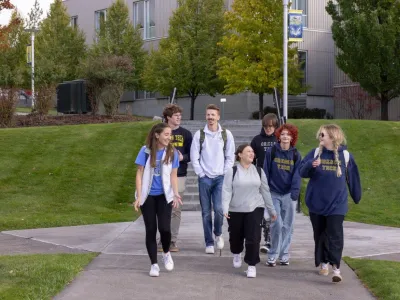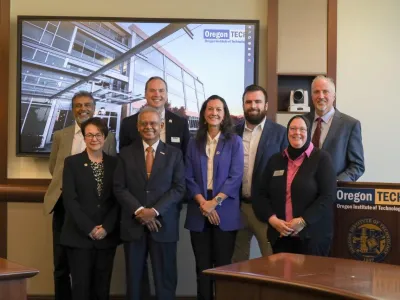- Heard a Debt Policy Presentation and Investment Performance Review from Penny Burgess, Director of Treasury Operations with the University Shared Services Enterprise, and Interim VP Meyer.
- Reviewed the Third Period Financial Report.
- Discussed the One-time Funding Philosophy.
- Heard an update of the Facility Master Plan.
- Heard an update on the Institutional Risk Assessment Process.
- Approved adoption of the Policy on Recommending Candidates for At-Large Board Positions.
- Heard an update on Marketing, Communications and Public Affairs activities over the last year and plans for 2015-16 from Associate Vice President Di Saunders.
- Discussed the HECC University Evaluation process.
- Heard a Legislative Update from Associate Vice President Lita Colligan including where Oregon Tech is investing the 2015-17 state funding and what the key issues that the legislature may be looking at in the 2016 short session.
- Heard a report from Faculty Senate President, Robyn Cole, including information on faculty research, collaborating with the Board, how teaching is changing, and faculty workload.
- Heard a report from Klamath Falls ASOIT President Kristen Marsters on student activities and engagement and changes in their governance approach for the Klamath Falls and Wilsonville campuses.
- Welcomed and heard a report from Greg O’Sullivan, Klamath County Economic Development Association, on current plans and actions underway and ways that KCEDA can work with Oregon Tech.
- Approved the Resolution Acknowledging Institutional Responsibilities Under the Program
- Participation Agreement Related to Title IV Financial Assistance Programs.
- Completed an Executive Session related to Employment of Public Officers, Employees, and Agents; and Review and Evaluate Performance of Public Officers and Employees.
- Discussed the development of Oregon Tech Dashboards that would be used to help with university decision making, track progress and give the Board a consistent format from which to review key indicators of success.
- Heard an update on Internal Audit options from Interim VP Meyer.
Oregon Tech Board of Trustees tackle budget, discuss academic plan, and learns about student support services at October meeting
KLAMATH FALLS, OR: October 9, 2015 – The Oregon Institute of Technology (Oregon Tech) Board of Trustees, met October 8 and 9 at its Klamath Falls Campus, covering agenda items from budget approval to the university’s Academic Plan to the broader issues affecting students at Oregon Tech overall.
Academic Plan Overview Oregon Tech’s Dean of the College of Health, Arts, and Sciences, LeAnn Maupin, presented progress on the university’s new Academic Plan on behalf of Provost Brad Burda. Dean Maupin said that the development of the plan began with a situational analysis, which included Oregon Tech’s current degree portfolio, program innovation, available opportunities, and additional resources available or for which there is potential. The plan approaches enrollment targets by quadrant, which include the Klamath Falls, Wilsonville and Online Campuses; and extension sites such as Dental Hygiene programs at Chemeketa Community College and in La Grande with MODA Health; and the Boeing program in Washington. Areas that the plan covers include program capacity, opportunities for growth, enrollment projections, accreditation and assessment, impacts on General Education of program expansion, and plans for growth in tenure track faculty. Maupin described current initiatives under way, like the faculty Program Innovation Team or PIT Crew, the potential of the new Engineering Building, an update on the new Engineering, Technology and Management (ETM) Dean search, growth on the Wilsonville Campus, the Gen Ed transformation under way, plans for the Oregon Renewable Energy Center, and a review of Non-tenure track faculty positions to meet teaching needs.
Maupin described the innovative Rural Healthcare partnership with Oregon Health and Science University and Sky Lakes Medical Center, of which Oregon Tech will be engaged. The first cohort will be in Klamath Falls and are from several professional areas; Oregon Tech is providing space for the program in the Dow Center on campus.
Budget Review Oregon Tech’s Interim Vice President for Finance and Administration, Michelle Meyer, presented a comprehensive review of the budget picture for the university, including opportunities and challenges. Trustees asked that investments made by the institution be analyzed based on the return on investment yields to meet current mission and objectives, given the deficits in some areas of the budget. President Chris Maples noted that the increases in administrative costs reflect the return of positions that have been cut over time to meet state budget decreases, during periods where faculty positions were held harmless so that student instruction would not be affected. These are primarily in areas of direct student support, such as retention and enrollment management; and new student support positions in Wilsonville to handle increased student enrollment. Additionally, new expenses for services formerly covered by the Oregon University System are now incurred by Oregon Tech, and are also reflected in the budgeted administrative cost increases. Trustees noted that Oregon Tech needs to work towards developing a balanced budget to make strategic investments and be able to obtain its own credit rating and reasonable cost of borrowing.
After some discussion, the Board approved the 2015-16 budget, with a request that the university’s Executive Cabinet return to the Board with a strategic approach to balancing the budget.
Student Support Dr. Erin Foley, Vice President of Student Affairs and Dean of Students at Oregon Tech, reported on the structure and focus of student support systems. The mission of this area is to enhance the university’s dynamic learning community through opportunities for access, development, and success. Student Affairs departments collaborate with students, faculty, staff, and external constituents to promote engagement, encourage holistic wellness, and support persistence to graduation, as well as the realization of educational and professional aspirations for students and alumni. Student services has a comprehensive approach, serving students from the point of recruitment to degree attainment and alumni status, from basic needs like housing, financial aid and safety, to social interaction, academic supports, student engagement, and faculty interaction. Dr. Foley provided current information on student retention and graduation rates and the existing and new initiatives that have promise to increase these.
Angela Archer, Coordinator of Oregon Tech’s federal TRIO program, called Tech Opportunities Program (TOP) reported on program outcomes. TOP, which recently had its 5-year competitive grant renewed by the US Department of Education, serves about 160 students annually who are first-generation, low income or students with disabilities. TOP results are impressive: 98% of students are in good academic standing; they have a 90% persistence rate; and have a 76% 6-year graduation rate, which compares with an overall rate for Oregon Tech in the 50% range. Additional funds from the Legislature will be invested in student support over the current biennium, allowing Oregon Tech to offer TOP-like services to an additional 120 students, an increase of 75%.
Higher Ed Trends President Maples provided an overview of the trends and issues in higher education that affect Oregon Tech. These include changes in revenue sources, with the largest impact being the decline in state funding and the increased reliance on student tuition revenues. Oregon remains among the worst states for funding per student from the state, currently ranked at 47th. Between 2008 and 2015, Oregon’s state funding per student declined more than 33%, and tuition for Oregon colleges and universities increased an average of 31%. He noted that there remains a gap between low-income and other students – and between rural and non-rural students -- and thus the importance of student services investments that help students academically and otherwise to stay enrolled and engaged to graduation, particularly those most at risk.
In other actions and discussions at both Committee and Full Board meetings, the Board:
About Oregon Tech
Founded in Klamath Falls in 1947, Oregon Institute of Technology is the premier public polytechnic institution in the Pacific Northwest. Oregon Tech provides degree programs in engineering and health technologies, management, communication, and applied sciences that prepare students to be effective participants in their professional, public, and international communities through hands-on, applied and relevant learning. Oregon Tech has a full-service, residential campus in Klamath Falls and an urban, industry-focused campus in Wilsonville. Visit www.oit.edu to learn more about Oregon Institute of Technology.
###
-
All Locations
Professor Jared Emard (checkered shirt) and Klamath County Public Worksand…
-
All Locations
For the second year in a row, Oregon Institute of Technology (Oregon Tech) is pleased to welcome its largest freshman class during the last four…
-
All Locations
Back row left to right: Kanth Gopalpur (Oregon Tech Board of Trustees), John…









